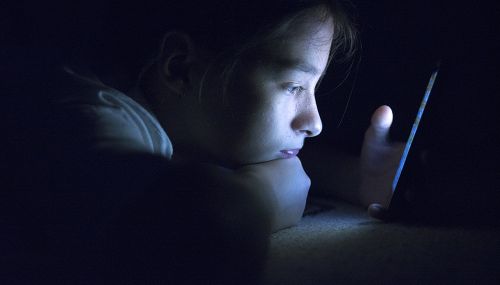
- Our studies
- Our research
- Publications and resources
- Data access and training
- About
- News
- Events
- Get in touch
- Join our mailing list


Adolescents who use social media for at least three hours a day are more likely than their peers to go to sleep late and have trouble waking during the school week.
Researchers from the University of Glasgow analysed data on more than 11,500 people born in the UK at the turn of the century who are taking part in the Millennium Cohort Study. They looked at information collected at age 14 on their daily social media habits, comparing these responses with their sleeping routines. They took into account factors that could be associated with heavy social media use and poorer sleep, such as family background, mental health and wellbeing, and physical health.
Heavy social media users, those who used social networking or messaging sites for three to five hours a day, were 17 per cent more likely to go to sleep after 11pm on school nights compared to average users, who used social media for one to three hours each day. Heavy social media users also tended to have trouble waking during the week, being 54 per cent more likely to get up later than 8am compared to average users. The heaviest social media users, those who went online for more than five hours a day, were 70 per cent more likely to go to bed late compared to average users, and were 91 per cent more likely to get up later than 8am. They were also more likely than average users to have disrupted sleep during the night.
More than a fifth of adolescents spent at least five hours a day on social media apps and sites such as Facebook, Twitter and Whatsapp. One in seven spent three to five hours a day. Around a third went online for one to three hours a day, and just over a third accessed social media for less than an hour a day or never. Girls were twice as likely as boys to spend more than five hours a day on social media, and were also more likely to go to bed late, have trouble falling asleep and experience disrupted nights. In previous research, poor sleep has been found to have implications for adolescents’ mental health, obesity and academic performance.
The report explained that social media might be disrupting sleep during the school week as teens could be catching up with their friends on social media close to bedtime. It also suggested that social media might indirectly interrupt a regular sleeping schedule as other activities, such as homework, could be delayed due to checking and responding to social media notifications.
However, the researchers recognised that at a time of growing independence keeping teens from their phones could be “especially challenging” and recommended that future research look at “how best to support young people to balance these rewarding online social interactions with an appropriate and consistent sleep schedule, to optimise associated health and school outcomes”.
This research was covered extensively in the national news in October 2019, featuring in the following media outlets:
BBC News – Heavy social media use linked to poor sleep
Telegraph – Teens missing vital sleep before school due to social media
‘Social media use and adolescent sleep patterns: cross-sectional findings from the UK millennium cohort study,’ by Holly Scott, Stephany M Biello and Heather Cleland Woods was published in BMJ Open in October 2019
Ryan Bradshaw
Senior Communications Officer
Phone: 020 7612 6516
Email: r.bradshaw@ucl.ac.uk